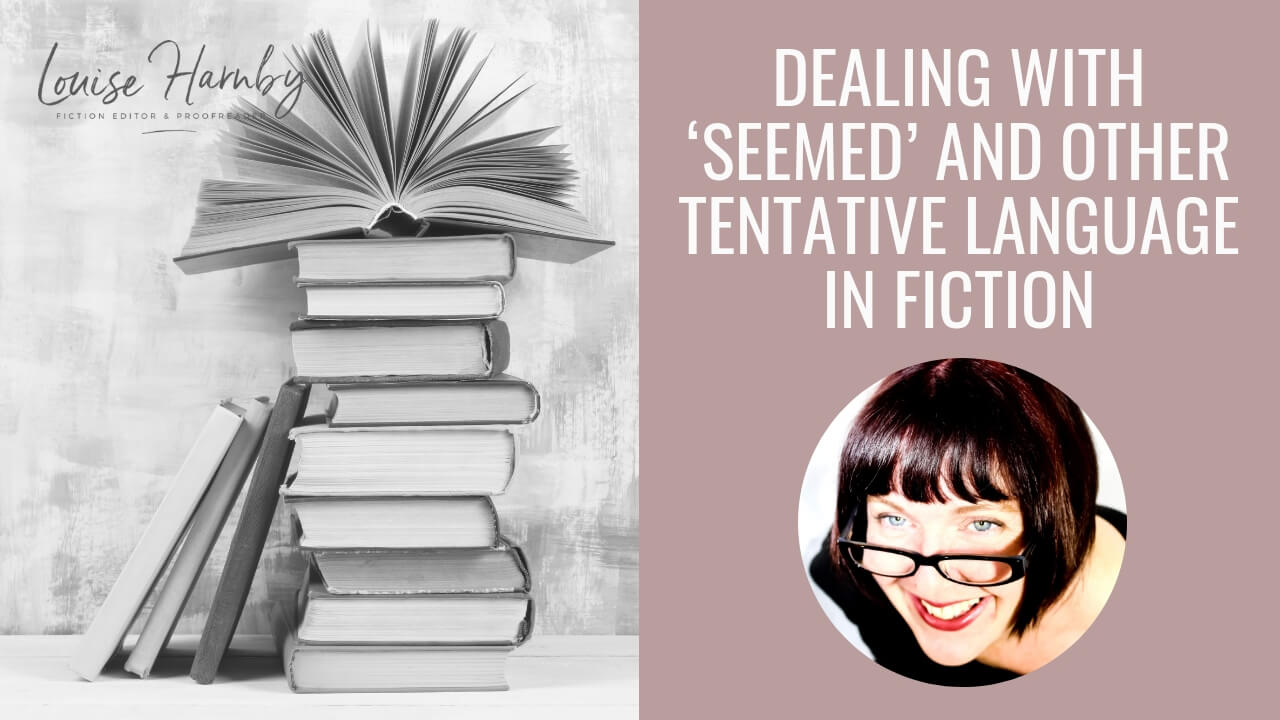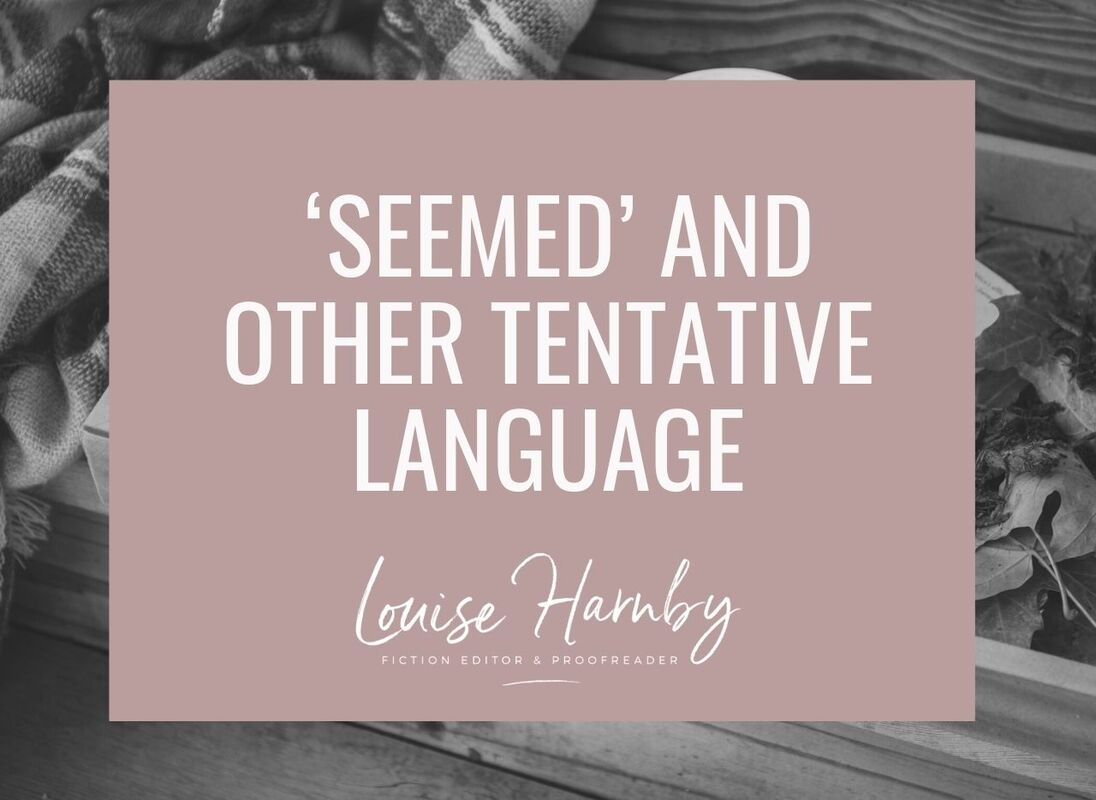|
If your characters seem or appear to be doing or feeling something – probably, maybe, perhaps – then you might be using half measures to express a good chunk of that action or emotion. Uncertainty can drag a story down. Here’s how to edit for it at line level.
In fiction, tentative language can lead to the following:
Authors sometimes introduce tentative language into a novel because:
Tentative language: words to watch out for I’m not suggesting you remove every tentative word; some might be deliberate and necessary. More likely, you’ll be checking that your prose isn’t rife with them. Still, these little blighters can slip in accidentally and it’s worth taking the time to root them out and decide whether to give them space on your page or remove them. Here are some of the words (or word groups) to watch out for:
When there’s a problem, it can sometimes be fixed with a simple deletion, or a stronger verb. When viewpoint, tension and reader immersion are at stake, more intervention might be required. How to fix it without dropping viewpoint I see the likes of seemed, appeared, and looked as if creeping frequently into line editing projects for less experienced authors because they want to hold viewpoint. Hats off to them – I’ll take a seemed over a head-hop any day of the week! Still, there might be a better fix. Here’s a framework you can use to recast in a way that removes the uncertainty but keeps the narrative alive.
In the examples below, I’ve used this framework to craft a shown narrative rather than an assumed one. The original text is based on real examples that have been adapted to respect confidentiality.
EXAMPLE 1
Luke peeked around the headstone. The hooded man seemed frustrated.
Luke can’t know for sure how the other character is feeling, and the author covers this with seemed. That’s all well and good; removing it would flip the reader from Luke’s internal experience to the hooded man’s.
The sentence is flat though. Yes, we readers are still in Luke’s head but it’s not a particularly interesting space. There’s no tension in our observations from his hiding place. Here’s how the fixing framework helped me recast in a way that shows readers the hooded man’s assumed frustration, as seen by Luke: Luke peeked around the headstone. The hooded man glanced at his watch and swore under his breath. His foot lashed out, knocking over a grave vase. The stagnant water stunk and Luke wrinkled his nose.
In the revised version, we see the hooded man’s emotion through his action. That helps with the flatness but also with narrative distance; we stay close to Luke because we experience not only what he sees but also what he smells. It’s more immersive.
EXAMPLE 2
Thom turned and tripped over the blind guy’s white stick – Mikey, someone had called him. He looked at Mikey, who seemed almost to be picking out Thom’s facial features in his mind.
Thom is the viewpoint character so we can’t know what’s going on in Mikey’s head. And that means we can’t just remove the tentative words and change the verb to picked.
But there’s a problem. If Mikey were the viewpoint character, his imagining Thom’s face would make for an interesting narrative. However, it’s Thom’s head we’re in. In this case, the assumption seems off, too big to believe. When I listen to someone speaking, I tend to use my eyes to focus on their mouths; my friend with restricted vision tends to move his head so that his ears are more in play. Sighted people in his company need to be aware that his eyes don’t focus directly on a speaker even though he’s fully engaged. If we place this experience within the fixing framework, we can imagine Mikey’s physicality and the effect on Thom, the viewpoint character. Thom turned and tripped over the blind guy’s white stick – Mikey, someone had called him. Mikey tilted his head, gaze off-centre, ear trained on Thom’s blustered apology.
In the revised version, the assumption is gone. Instead, readers are shown what Mikey does and what Thom experiences. Viewpoint is intact, and the clunk has gone.
How to fix an insecure narrative voice In the examples below, the tentative words have crept in because the authors are still developing the confidence to make every word count. Useful tools of the trade include deletion, stronger verbs, smoother recasts, and free indirect style. The fixes below are suggestions only, offered so you have an idea of what to look out for and how you might tackle the solution. The approach you use will depend on your writing style and the mood of the scene. When tentative language creates a flat sentence In these examples, the tentative mood is justified but the sentences are rather flat. We need to inject tension.
When tentative language creates a woolly sentence
In these examples, the tentative words relate to viewpoint characters’ experiences. The uncertainty introduces distance because it pulls the reader out of their experience. It makes us say, ‘Why the lack of commitment? Doesn’t the viewpoint character know?’ Once more, I’ve used real examples and adapted them to disguise the originals.
When tentative language works
In these examples, the tentative words work. They show the reader that the viewpoint character is guessing. She glowered as if to say, You really think there’s enough meat on that plate? Mark glanced at the blue car. There were two people inside, neither familiar. Might be undercover cops, but he legged it anyway … just in case. A haze hung in the air – maybe brick dust from the fallen building or ash from the fire. It stung his eyes and irritated his throat. The news knocked the breath out of her. Jamie had seemed happy the last time they’d met. Ecstatic even, what with the new job, the kayaking holiday, that girl he’d met the week before. She combed the beach for Ben’s blue sun hat, pushing the unthinkable to the back of her mind. Thought it through. Probably with Mark at the rockpool. The café maybe. Or the groyne or the dunes. Her head spun left, right, left again. Summing up As soon as a writer or editor begins line editing fiction, subjectivity comes into play. It’s rare that there’s a right or a wrong way. With that in mind, don’t ban tentative language in your prose; just watch out for it. It may well have the right to be there, though it shouldn’t trump tension or add clunk. If removing it messes with viewpoint, use the fixing framework to craft an alternative shown narrative.
Louise Harnby is a line editor, copyeditor and proofreader who specializes in working with crime, mystery, suspense and thriller writers.
She is an Advanced Professional Member of the Chartered Institute of Editing and Proofreading (CIEP), a member of ACES, a Partner Member of The Alliance of Independent Authors (ALLi), and co-hosts The Editing Podcast.
9 Comments
7/10/2019 02:48:22 pm
Guilty of all the above! 😄 Printing this one out. Thanks, Louise!
Reply
Louise Harnby
24/1/2020 02:44:54 pm
Glad you enjoyed it, Felicia!
Reply
10/10/2019 02:19:18 pm
I bow my head to editors. It's a hard task to fix a manuscript. Since I can't afford an editor, I use ProWriting Aid to point to my mistakes. Grammarly helps with commas. After months of editing my second book, I'm waiting for the ProWriting to accuse me of being passive-aggressive. I'm learning.
Reply
Louise Harnby
24/1/2020 02:47:44 pm
You're very welcome, Susanne. It's tough for indie authors on a budget. Learning to self-edit well is a great step forward. So is using complementary tools. Good luck with your book!
Reply
Lindsey Russell
6/11/2019 08:49:55 pm
I've been busy on a little painting and only just spotted this. Excellent article as usual. My first drafts tend to be littered with tentative language but I have a 'list' and hopefully prune/rephrase to eliminate unless they are used deliberately - loved your sentence:
Reply
Louise Harnby
7/11/2019 09:19:09 am
I use tentative language in my non-fic writing all the time, Lindsey! When we do this, (maybe) it's because we don't want to sound preachey.
Reply
Louise Harnby
7/11/2019 09:20:57 am
Are you painting as in decorating or painting as in creating art? Either way, I hope you're pleased with your brushwork! I have some of my own coming up; a bathroom leak led to ceiling below collapsing. Major repairs on the way!
Reply
Lindsey Russell
7/11/2019 12:47:14 pm
Painting as in a picture - in the 'naive' style :)
Reply
Louise Harnby
2/1/2020 02:55:59 pm
I think when there's conclusion-drawing going on, tentative language is entirely appropriate, especially given the spying. You'll want the reader to have a sense of the VP character trying to work out what's going on so it's good for mystery and suspense. Leave a Reply. |
BLOG ALERTSIf you'd like me to email you when a new blog post is available, sign up for blog alerts!
TESTIMONIALSDare Rogers'Louise uses her expertise to hone a story until it's razor sharp, while still allowing the author’s voice to remain dominant.'Jeff Carson'I wholeheartedly recommend her services ... Just don’t hire her when I need her.'J B Turner'Sincere thanks for a beautiful and elegant piece of work. First class.'Ayshe Gemedzhy'What makes her stand out and shine is her ability to immerse herself in your story.'Salt Publishing'A million thanks – your mark-up is perfect, as always.'CATEGORIES
All
ARCHIVES
July 2024
|
|
|
|

















 RSS Feed
RSS Feed





